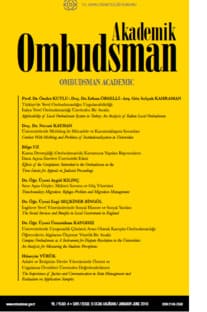DEMOCRACY, RULE OF LAW, AND THE OMBUDSMAN
___
- Mark Mazower, Dark Continent: Europe’s Twentieth Century (London: Allen Lane, the Penguin Press, 1998) and Norman Davies, Europe: A History (London: Pimlico, 1997). Leonard Binder et al., Crises and Sequences in Political Development (Princeton, NJ: Princeton University Press, 1971). A. V. Dicey, Introduction to the Study of the Law of the Constitution (London: Macmillan, 1961) David Lindsay Keir, The Constitutional History of Modern Britain since 1485 (Princeton, NJ: Van Nostrand, 1963) Harold J. Laski, Parliamentary Government in England (London: Allen and Unwin, 1963) Andre Mathiot, The British Political System (London: Hogarth Press, 1958) Guillermo O’Donnell, “Why the Rule of Law Matters,” Journal of Democracy 15:4 (October 2004) Adam Przeworski, eds., Democracy and the Rule of Law (Cambridge: Cambridge University Press, 2003) Andreas Ch. Takis, “Ombudsmanship, Human Rights, and the Rule of Law,” in Dimitris Christopoulos and Dimitris Hormovitis, eds., The Ombudsman in South-Eastern Europe (Athens and Brussels: Sakkoulas and Bruylant, 2005) Max Weber, Economy and Society, edited by Guenther Roth and Claus Wittich, (Berkeley, CA: University of California Press, 1978) Yossi Shain and Juan J. Linz, Between States: Interim Governments and Democratic Transitions (Cambridge: Cambridge University Press, 1995) Baron de Montesquieu, The Spirit of the Laws (New York: Hafner, 1962) Robert R. Palmer, The Age of Democratic Revolution: A Political History of Europe and America, 1760-1800, 2 vols., (Princeton, NJ: Princeton University Press, 1959) Robert A. Dahl, Democracy and its Critics (New Haven, CT: Yale University Press, 1989) Benjamin Constant, “De la libertė des anciens à celle des modernes,” in idem Cours de politique constitutionelle ou collection des ouvrages publiės sur le gouvernement représentatif (Paris: Guillaumin, 1872), vol. 2 Dahl, Democracy and its Critics, 108-15 and passim; Juan J. Linz, “Totalitarian and Authoritarian Regimes,” in Fred I. Greenstein and Nelson W. Polsby, eds., Handbook of Political Science, vol. 3 (Reading, MA: Addison Wesley, 1975) Richard Gunther, P. Nikiforos Diamandouros and Hans-Jürgen Puhle, eds., The Politics of Democratic Consolidation: Southern Europe in Comparative Perspective (Baltimore, MD: Johns Hopkins University Press, 1995) Scott Mainwaring, Guillermo O’Donnell and J. Samuel Valenzuela, eds., Issues in Democratic Consolidation: The New South American Democracies in Comparative Perspective (Notre Dame, IN: University of Notre Dame Press, 1992) Terry Lynn Karl, “Imposing Consent? Electoralism vs. Democratization in El Salvador,” in Paul Drake and Eduardo Silva, eds. Elections and Democratization in Latin America, 1980-85 (San Diego, CA: Centre for Iberian and Latin American Studies, 1986) Wolfgang Merkl, “Embedded or Defective Democracies,” as well as Merkl and Aurel Croissant, “Conclusion: Good and Defective Democracies,” Democratization 11:5 (December 2004) Dahl, Democracy and its Critics, 207, as well as Juan J. Linz and Alfred Stepan, Problems of Democratic Transition and Consolidation: Southern Europe, South America, and Post-Communist Europe (Baltimore, MD: Johns Hopkins University Press, 1996) Arend Lijphart, Patterns of Democracy. Government Forms and Performance in Thirty-Six Countries (New Haven, CT: Yale University Press, 1999) P. Nikiforos Diamandouros, “Cultural Dualism and Political Change in Postauthoritarian Greece,” (Madrid: Juan March Centro de Estudios Avanzados en Ciencias Sociales, 1994, Working Paper 50) Leonardo Morlino, “What is ‘Good’ Democracy?”, Democratization 11:5 (December 2004) Guillermo O’Donnell, Jorge Vargas Cullell, and Osvaldo M. Iazzetta, eds., The Quality of Democracy: Theory and Applications (Notre Dame, IN: University of Notre Dame Press, 2004) O’Donnell cited in note 3 above, the contributions by Diamond and Morlino, Schmitter, Beetham, Rueschemeyer, Powell, and Plattner devoted to this topic in Journal of Democracy 15:4 (October 2004) Andreas Schedler, Larry Diamond and Marc F. Plattner, eds., The Self-Restraining State: Power and Accountability in New Democracies (London: Lynne Rienner, 1999)
- ISSN: 2148-256X
- Yayın Aralığı: 2
- Başlangıç: 2014
- Yayıncı: Kamu Denetçiliği Kurumu
DEMOCRACY, RULE OF LAW, AND THE OMBUDSMAN
CEZA MUHAKEMESİNDE HAKKANİYETE UYGUN YARGILANMA HAKKINA İLİŞKİN ESASLAR
ÖZDENETİM, SOSYAL SORUMLULUK VE MEDYADA OMBUDSMANLIK UYGULAMALARI
HUKUK DEVLETİ İLKESİ IŞIĞINDA İDARENİN DENETİMİ VE KAMU DENETÇİLİĞİ KURUMU
UYUŞMAZLIK ÇÖZME SÜREÇLERİ İÇİNDE KÜLTÜRÜN YERİ: YAKLAŞIMLAR, EKSİKLİKLER VE ÖNERİLER
